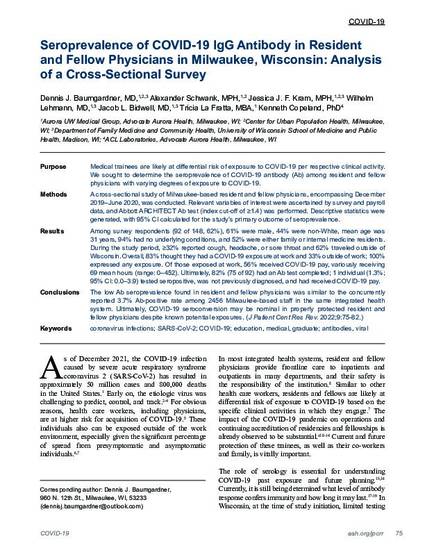
- coronavirus infections; SARS-CoV-2; COVID-19; education,
- medical,
- graduate; antibodies,
- viral
Purpose: Medical trainees are likely at differential risk of exposure to COVID-19 per respective clinical activity. We sought to determine the seroprevalence of COVID-19 antibody (Ab) among resident and fellow physicians with varying degrees of exposure to COVID-19.
Methods: A cross-sectional study of Milwaukee-based resident and fellow physicians, encompassing December 2019–June 2020, was conducted. Relevant variables of interest were ascertained by survey and payroll data, and Abbott ARCHITECT Ab test (index cut-off of ≥ 1.4) was performed. Descriptive statistics were generated, with 95% CI calculated for the study’s primary outcome of seroprevalence.
Results: Among survey respondents (92 of 148, 62%), 61% were male, 44% were non-White, mean age was 31 years, 94% had no underlying conditions, and 52% were either family or internal medicine residents. During the study period, ≥ 32% reported cough, headache, or sore throat and 62% traveled outside of Wisconsin. Overall, 83% thought they had a COVID-19 exposure at work and 33% outside of work; 100% expressed any exposure. Of those exposed at work, 56% received COVID-19 pay, variously receiving 69 mean hours (range: 0–452). Ultimately, 82% (75 of 92) had an Ab test completed; 1 individual (1.3%; 95% CI: 0.0–3.9) tested seropositive, was not previously diagnosed, and had received COVID-19 pay.
Conclusions: The low Ab seroprevalence found in resident and fellow physicians was similar to the concurrently reported 3.7% Ab-positive rate among 2456 Milwaukee-based staff in the same integrated health system. Ultimately, COVID-19 seroconversion may be nominal in properly protected resident and fellow physicians despite known potential exposures.
Baumgardner DJ, Schwank A, Kram JJ, Lehmann W, Bidwell JL, La Fratta T, Copeland K. Seroprevalence of COVID-19 IgG antibody in resident and fellow physicians in Milwaukee, Wisconsin: analysis of a cross-sectional survey. J Patient Cent Res Rev. 2022;9:75-82. doi: 10.17294/2330-0698.1846
